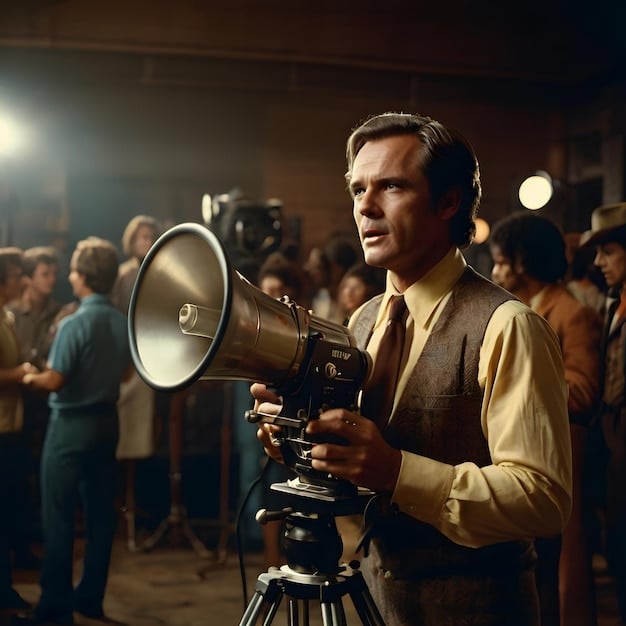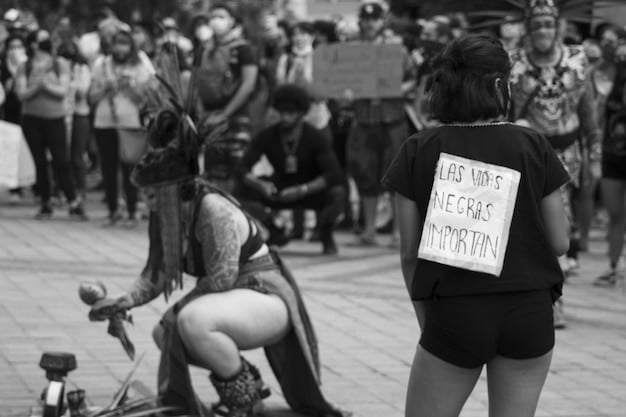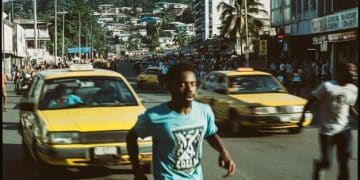Censorship Controversy: Brazilian Documentary Faces Government Review

A censorship controversy: government reviewing content of upcoming Brazilian documentary has erupted, raising concerns about artistic freedom and government overreach in Brazil’s film industry. The documentary’s subject matter is now under scrutiny, sparking debate about the limits of expression.
The upcoming Brazilian documentary has become the center of a censorship controversy: government reviewing content of upcoming Brazilian documentary. This intervention raises critical questions about artistic freedom and the role of government in cultural expression. The film’s themes and potential impact are now subjects of intense debate.
What are the implications of this review for filmmakers in Brazil and beyond? And how will this censorship controversy: government reviewing content of upcoming Brazilian documentary affect the future of creative storytelling?
Government Intervention in Brazilian Documentary
The debate surrounding the censorship controversy: government reviewing content of upcoming Brazilian documentary highlights the delicate balance between artistic expression and potential government oversight. The situation has ignited discussions about the extent to which governments should involve themselves in the artistic process.
Historical Context of Censorship in Brazilian Cinema
Brazilian cinema has a complex history with censorship, marked by periods of repression under dictatorial regimes. Filmmakers often had to navigate strict rules and regulations, finding creative ways to express their ideas while avoiding direct confrontation with the authorities.
- The impact of censorship during the military dictatorship (1964-1985) on Brazilian film production.
- Examples of films that were censored or banned during this period, and the reasons behind the censorship.
- The role of filmmakers in resisting censorship and pushing the boundaries of artistic expression.
The Current Climate and Freedom of Expression
The recent focus on a censorship controversy: government reviewing content of upcoming Brazilian documentary comes at a time when questions about freedom of expression are increasingly pertinent. Understanding the existing legal frameworks that protect and potentially limit artistic expression is essential.
Legal protections for freedom of speech in Brazil provide a framework but have limitations. The interpretation of these laws can change depending on political climate. These protections exist to prevent unjustifiable censorship and safeguard democratic ideals.

Navigating these legal and political landscapes is a constant challenge for filmmakers. The current censorship controversy: government reviewing content of upcoming Brazilian documentary highlights how government involvement can cast a shadow on creativity and artistic expression.
In conclusion, this government intervention raises questions about cultural autonomy and the spirit of creative exploration.
What Triggered the Review?
Understanding the reasons behind the censorship controversy: government reviewing content of upcoming Brazilian documentary requires examining the documentary’s subject matter and the government’s stated concerns. The specific details of the film and the objections raised are critical to understanding the context.
Documentary’s Subject Matter
The documentary tackles sensitive social and political topics. It is important to detail the specific issues the film addresses and why they may be controversial within the current political landscape.
- The main themes explored in the documentary and the perspectives it presents.
- The potential social and political impact of the documentary’s message.
- How the documentary challenges or reinforces existing narratives and power structures.
Government’s Stated Concerns
The government has voiced certain reservations, which spark considerations regarding the validity and intentions behind the review process. Details about what has been formally communicated by government entities are important to transparently evaluate the issues.
Official statements and any legal justifications invoked by the government. Transparency is paramount for maintaining legitimacy. All stakeholders must have confidence in the reasons provided.
The concerns that are voiced by the government about the documentary’s influence on public opinion and its potential to disrupt social order. This is vital in the censorship controversy: government reviewing content of upcoming Brazilian documentary.

Exploring what triggered the review can deepen understanding about governmental oversight. The documentary may challenge prevailing power structures or existing narratives. This makes it subject to scrutiny.
The documentary is at the center of the censorship controversy: government reviewing content of upcoming Brazilian documentary, and understanding the issues discussed can shed light on why government intervention has happened. These details are vital for assessing the justification for government actions.
Public Reaction and Industry Response
The censorship controversy: government reviewing content of upcoming Brazilian documentary has provoked a range of opinions and actions from both the public and the film industry. This diversity highlights the importance of open dialogue.
Public Opinion
Different segments of the public have reacted differently, reflecting the divisions within Brazilian society. Some express support for artistic freedom and concern over government overreach, while others may agree with the government assessment, leading to multifaceted public reactions.
These multifaceted public reactions mirror the complexities inherent in a society with varying perspectives. Analyzing this spectrum of reactions provides a comprehensive view of underlying social dynamics.
- Examples of public statements, social media discussions, and petitions related to the controversy.
- Analysis of the different perspectives and arguments presented by the public.
- The role of media coverage in shaping public opinion on the issue.
Responses from the Film Industry
Filmmakers, actors, and other industry experts have come forward to voice their apprehension about the censorship controversy: government reviewing content of upcoming Brazilian documentary. These industry participants play a pivotal role in advocating for creative expression. By uniting, they seek to defend artistic ideals.
Many advocate for the need for artistic liberty and autonomy from state interference. They underscore the value of varied views in art.
The active role of industry organizations, such as film festivals and guilds, in speaking out against censorship and offering support to the filmmakers involved in the censorship controversy: government reviewing content of upcoming Brazilian documentary.
This united stance seeks to protect the diversity and depth necessary for a rich societal dialogue.
The public and professional reactions to the censorship controversy: government reviewing content of upcoming Brazilian documentary reflect ongoing fights surrounding artistic expression. These multifaceted reactions are vital elements in shaping public dialogue.
The Role of Film Festivals and International Support
Film festivals serve as crucial venues for premiering and promoting films, and they often have a key role in advocating for artistic freedom when faced with censorship. International support from film communities and human rights organizations is also important.
Film Festivals as Platforms
Film festivals often feature films that explore sensitive subjects and challenge social norms. They are important platforms for diverse voices.
Details on how film festivals might increase their support to the documentary at the heart of the censorship controversy: government reviewing content of upcoming Brazilian documentary, giving it a platform to engage audiences meaningfully. Festivals provide alternatives when mainstream channels face political pressures.
- Examples of film festivals that have supported films facing censorship in the past.
- How festivals can provide a platform for censored films to reach audiences and gain recognition.
- The role of festivals in raising awareness about censorship issues and promoting freedom of expression.
International Support and Solidarity
International support shows resolve in maintaining cultural and creative freedoms on a global level. Such support offers recognition to the involved filmmakers, while also stressing the importance of independence.
International film communities, human rights groups, and other entities have spoken up regarding the censorship controversy: government reviewing content of upcoming Brazilian documentary. Their united support exemplifies shared principles about artistic freedoms.
Solidarity underscores the significance of free expression in modern society.
Film festivals and international support networks serve pivotal functions in countering censorship. These efforts emphasize the significance of defending artistic liberty and encouraging cross-border partnerships that value cultural expression.
Legal and Constitutional Aspects
Analyzing the legal and constitutional dimensions of the censorship controversy: government reviewing content of upcoming Brazilian documentary is critical for assessing whether the government’s actions are lawful and consistent with fundamental rights. A close assessment is fundamental for upholding accountability.
Relevant Laws and Constitutional Provisions
Brazilian law safeguards freedom of expression, but it also allows for restraints when public safety or other protected rights are at stake. It is vital to establish which precise legal or constitutional points are pertinent to the government review.
- Overview of the specific articles in the Brazilian Constitution that pertain to freedom of expression and censorship.
- Discussion of any relevant laws or regulations that could be used to justify government intervention in artistic expression.
- Analysis of how these laws and provisions have been interpreted and applied in previous censorship cases.
Arguments For and Against Government Review
Debates about the censorship controversy: government reviewing content of upcoming Brazilian documentary mirror deep constitutional and philosophical topics. Arguments for government oversight stress protection of societal standards. Meanwhile, those confronting it highlight the essential nature of freedom for creative expression in the arts.
Examining the arguments surrounding this controversy provides valuable insights into both constitutional and philosophical matters.
The legal and constitutional aspects of this dispute are complex. A deep evaluation is necessary to comprehend the intricacies. Ensuring fairness means protecting the artist’s voice and respecting the public good.
| Key Point | Brief Description |
|---|---|
| 🎬 Government Review | Details on the government’s specific concerns about the documentary. |
| 🗣️ Public & Industry Reaction | Analysis of the responses from the public and film industry. |
| 🌍 International Support | The role of global film communities in defending artistic freedom. |
| ⚖️ Legal Aspects | Examination of laws related to freedom of speech in Brazil. |
Frequently Asked Questions
The government has stated that it is reviewing the documentary due to concerns about its content, which allegedly touches on sensitive social and political issues. However, specifics are not clear. This ignited the censorship controversy: government reviewing content of upcoming Brazilian documentary.
Artistic freedom is the liberty to express oneself through artistic mediums without undue interference or censorship. It is a fundamental aspect of free speech and cultural expression, essential in a democratic society.
Film festivals have often provided platforms for films facing censorship, offering screenings and support to filmmakers. They advocate for artistic expression, which is crucial during instances such as the censorship controversy: government reviewing content of upcoming Brazilian documentary.
Brazilian law protects freedom of expression, but these rights are not absolute and may be subject to certain limitations, such as public safety or national security. The interpretation can vary with different governing bodies.
Support can be shown through public advocacy, attending screenings, and contributing to legal defense funds. Raising global awareness about censorship helps ensure that artistic freedom is defended, especially in cases like this censorship controversy: government reviewing content of upcoming Brazilian documentary.
Conclusion
The censorship controversy: government reviewing content of upcoming Brazilian documentary raises significant concerns about government intervention and artistic freedom. The documentary underscores the importance of open dialogue in Brazil’s society.
As the review unfolds, the global community must observe with vigilance, upholding the principles of free expression. Supporting films such as the documentary can help foster awareness about the intricacies of this emerging problem.





